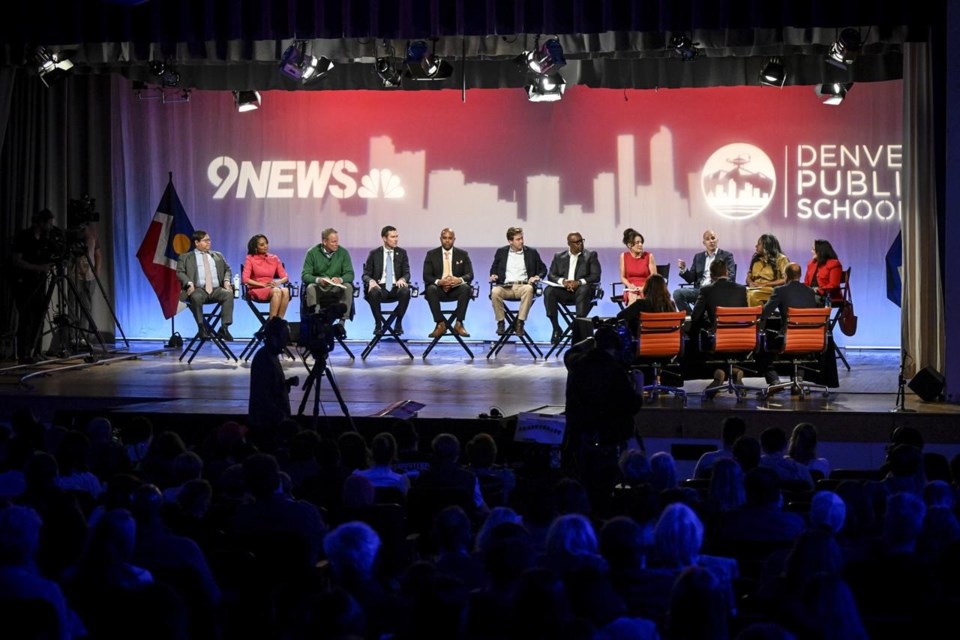DENVER (AP) — Crowded in a small ballroom at Denver's ritzy Maven Hotel, a mayoral election watch party for candidate Mike Johnston broke into applause and cheers when the first batch of votes were returned Tuesday night.
Their candidate, a former state senator and one of an unusually large and divergent field of 16 contestants vying for an increasingly powerful position, held a slim lead. Candidate Kelly Brough, president and CEO of the Denver Metro Chamber of Commerce, was close behind.
The stakes are high for Denver voters, said Ty Robertson, an engineer in Denver and Johnston supporter. The city has rapidly burgeoned into a major metropolis, she said, and “we just weren't prepared."
Denver faces a rising crime rate not seen for decades, growing homeless encampments and dizzying . The fear that undergirds the wide open race is clear. Denver — the fast-growing, relatively young, business and tech hub of the U.S. Mountain West — is tumbling toward a fate similar to that of other major cities.
“The San Franciscos or the Portlands or Seattles ... have not been able to turn the tide on things like homelessness and affordable housing and public safety,” said candidate Mike Johnston during a recent debate.
Johnston is among candidates seeking the political post as Denver’s CEO, a position that has become a steppingstone for ambitious politicians.
launched a successful gubernatorial campaign, which propelled him into the U.S. Senate, where he now represents Colorado. Going back further, after his tenure as Denver mayor, Frederico Peña went on to become U.S. Energy Secretary under former President Bill Clinton.
The other candidates in the race — including a former boxer, an investment banker, a state lawmaker and a former Crenshaw Mafia Gang member — were further behind the two frontrunners for the first unofficial batch of votes. The vast majority of votes remain to be counted.
Current Mayor Michael Hancock, who has run the city since 2011, can't run again because of term limits. Hancock’s long tenure in office has been the norm for Denver mayors over the last half century. This year’s winner will be only the sixth mayor elected since 1968.
The election likely won’t be decided until a June 6 runoff. Whoever wins will inherit a city that boasts a large aerospace and tech industry, six professional sports teams, a proud beer culture, and one of the fastest growing economies in the country.
The future mayor will also inherit a city experiencing a rise in gentrification, the highest crime rate in decades, and an increased rate of homelessness that grew by over 12% in the preceding two years — as well as an unprecedented surge in opioid overdoses that reached 473 deaths in 2021. Denver and the broader metro area has nearly doubled in population in the last three-decades — reaching roughly 3 million people in 2021.
Though the election is officially nonpartisan, most candidates are registered Democrats or unaffiliated, and range from state representatives to activists and people from disparate industries, including investment banking and professional boxing. Core disagreements have emerged between progressive and more moderate Democrats, especially when it comes to rising homelessness, police funding, and what are often called “ ,” where people can use drugs under supervision to prevent overdoses.
The question of whether to enforce Denver's camping ban, which is aimed at curtailing homelessness and a legacy of Hancock's administration, has divided the contestants. Most candidates, including Johnston and Brough, said they would enforce the ban.
Those who wouldn't enforce it include candidate Leslie Herod, a Democratic state representative, and Lisa CalderĂłn, executive director of an organization that helps women run for public office.
Two bills moving through the Colorado Legislature have also split candidates. The pieces of legislation would give municipalities, including Denver, the power to impose rent control and allow safe injection sites. Both proposals have left candidates split along roughly the same lines as they fall on a spectrum from moderate to progressive.
Whoever pulls ahead in the race will hold the reigns to a city that's both grown and suffered in recent years, as Denver becomes an increasingly popular place to live and important part of the western United States.
___
Jesse Bedayn is a corps member for the Associated Press/Report for America Statehouse News Initiative. is a nonprofit national service program that places journalists in local newsrooms to report on undercovered issues.
Jesse Bedayn, The Associated Press



